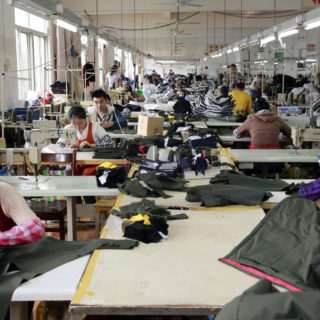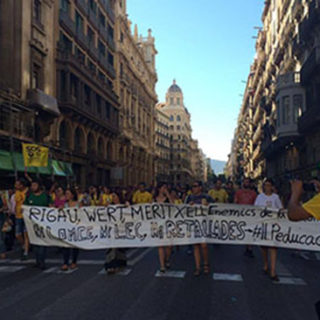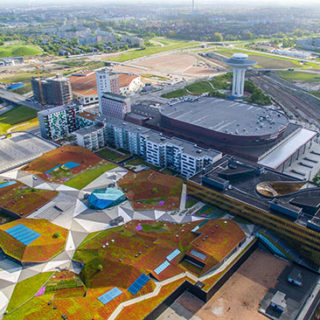Is it too cheap to fly?
The distance between Lund and Bangkok is roughly 8 593 kilometres. Quite far, in other words. This does not stop Thailand being one of the most popular international holiday destinations for Swedes, along with the USA and Mediterranean countries. Air travel to destinations both near and far has become increasingly popular. It comes at a price, though – including an environmental cost. So some people believe that air travel today is too cheap.
‟The major problem with the low-cost companies is that they are too good!”, says Jan Henrik Nilsson, associate professor in Human Geography, who works at Lund University’s Department of Service Management and Service Studies.
He conducts research and teaching on subjects including ‟Tourism: Mobility and Sustainability”, and has studied low-cost air travel.
‟The companies are extremely efficient and have low peripheral costs in many ways, and low prices naturally lead to increased demand”, he says.
The history of low-cost air travel starts with deregulation in the USA in the 1970s. Europe followed suit in the 1980s. The major breakthrough came after the start of the new millennium and continued with the deregulation of air travel in Eastern Europe in 2004. But deregulation in itself is not the biggest issue, according to Jan Henrik Nilsson.
‟It should not be necessary to return to the old system; that would just be stupid. The problem is not that air travel is deregulated – it’s that it is too cheap.”
“The fuel should really be taxed, especially if technological development is to speed up.”
Taxes are usually a tool that politicians like to use, both for income and to regulate various areas. But in the case of air travel, this approach runs into problems. Unlike other types of fuel, aviation fuel is indeed untaxed.
‟This is based on an international agreement dating from 1944, the Chicago convention. It considered tax to be a barrier to trade, which is why aviation fuel is still sold tax-free today. This can, of course, also be seen as an indirect subsidy”, points out Jan Henrik Nilsson.
‟Aviation really has major benefits. The old concept among seafarers of the freedom of the seas has been transferred to the skies, and there are very liberal rules for flying over almost all territories. The issue of whether to tax aviation fuel has been raised many times in the ICAO (International Civil Aviation Organization) but has always been vetoed by the USA and China, among others”, explains Jan Henrik Nilsson.
‟The fuel should really be taxed, especially if technological development is to speed up. Politically, we have solved equivalent problems in the past. In a regulated market economy, we manage this type of issue by using a pricing mechanism. There is nothing unique about the idea of taxing something which is damaging to the general public – in this case, climate change”, observes Jan Henrik Nilsson.
There is great consensus among researchers that tourism also affects climate change. Statistics show that five per cent of global greenhouse gas emissions originate from tourism and their main source is transport, with air travel as the largest single factor. According to the Swedish Environmental Protection Agency, the international air travel of Swedes is responsible for as many emissions as all car travel in the country.
At the same time, tourism is growing rapidly. Figures from the UNWTO (United Nations World Tourism Organization) show that the number of international tourist arrivals was just over 1.2 billion in 2016. Around 46 million more tourists travelled abroad compared to 2015. Meanwhile, the UN announced that 2017 would be the international year of sustainable tourism for development.
‟The average Joe’s holiday travel is the major factor in air traffic. Of course there is a lot of business travel, but the bulk of air travel is actually for tourism”, says Jan Henrik Nilsson.
At the same time, he observes that it can be difficult to change people’s attitudes.
‟When you talk about tourism and the environmental impact of aviation, the counter argument is often ´so am I not supposed to travel?’ In the 1970s, it was normal perhaps to travel to the Mediterranean or to the Alps. For my generation, the thing was to go inter-railing. Now it seems that a 19 year-old feels somewhat entitled to travel around the world.”
What is being done to reduce the environmental impact of air travel?
‟Quite a lot is actually being done, but flying is not inefficient – it is getting increasingly difficult to cut costs”, says Jan Henrik Nilsson.
‟Aviation kerosene is extremely energy-efficient in relation to its volume. Interesting experiments have been conducted with other types of aviation fuel, but we currently have no realistic alternative to the jet engine. The only serious alternative would be airships, in that case, but they have the disadvantage of taking too long, among other drawbacks. Rationing air travel? No, that is a feature of planned economy and it won’t work. The market is the best model we have. It has been possible to regulate other types of activities, so it must reasonably be possible to do so for air travel as well, using pricing and taxation. Then we must put our trust in new technology. Air travel is in many ways a very efficient form of transport. The problem is that it is rather too efficient for our own good”, summarises Jan Henrik Nilsson.
Text: Lars Ljunggren
Footnote: Aviation fuel used for commercial flights is tax-free. In Sweden, aviation fuel for private use is subject to tax.
Facts
-
The 10 most popular holiday destinations
-
One in three Swedes goes abroad twice per year or more. 54 per cent of all Swedes report having visited more than ten countries. The most popular holiday destinations for Swedes in 2016 were:
1. Spain,
2. Greece,
3. USA,
4. Thailand,
5. United Kingdom.
Source: Ticket Privatresor
-
Read more
-
Jan Henrik Nilsson: ‟Low-cost aviation” in Gössling/Upham (eds) Climate change and aviation – Issues, challenges and solutions, 2009.
Stefan Gössling: Carbon management in tourism – Mitigating the impacts on climate change, 2011.
unwto.org/en (Read under ‟Sustainable development of tourism”)








